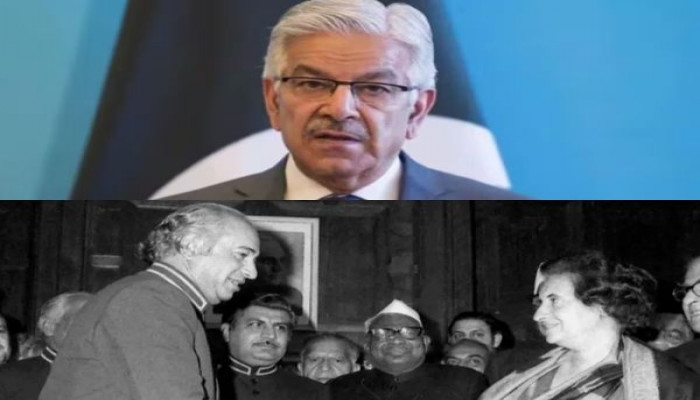Pakistan Defence minister terms Simla Agreement ' a dead document', effectively cedes Chhamb to India
- In Reports
- 07:59 PM, Jun 05, 2025
- Myind Staff
Pakistan Defence Minister Khawaja Asif made a provocative remark against India and referred to the 1972 Simla Agreement as a "dead document." He gave this statement during a televised interview on Wednesday. He said the agreement had no relevance now. He stated that Pakistan had effectively returned to the 1948 position on Kashmir. He announced that the Line of Control (LoC) is now a ceasefire line and not a formal boundary.
Asif said the bilateral framework between India and Pakistan had collapsed. He stated, "The Simla Agreement is now a dead document. We are back to the 1948 position, when the United Nations declared the LoC a ceasefire line following the ceasefire and resolutions." He added, "Going forward, these disputes will be dealt with multilaterally or internationally."
Asif also questioned the status of other India-Pakistan agreements. He remarked, "Whether the Indus Waters Treaty is suspended or not, Simla is already over."
Pakistani authorities had made similar comments earlier. Over the past few years, Islamabad had shown discomfort with the bilateral arrangement. Last month, Pakistan announced the suspension of the Simla Agreement. It also threatened to suspend it after India abrogated Article 370 in August 2019, removing Jammu and Kashmir’s special status. Pakistan kept raising the issue in international forums. India, on the other hand, maintained that all matters related to Jammu and Kashmir were internal.
The Simla Agreement, signed in 1972 after the 1971 Indo-Pak war, required both countries to resolve disputes bilaterally. India repeatedly said Kashmir was a bilateral matter and rejected third-party involvement.
Tensions rose again after a terror attack in Pahalgam, Jammu and Kashmir. 26 Indian tourists died in the attack carried out by terror outfits based in Pakistan.
Following this attack, Indian armed forces carried out precision strikes across the LoC. These strikes targeted terror launchpads under “Operation Sindoor.”
After these strikes, Khawaja Asif again dismissed the Simla Agreement in public, stating that it has become defunct.
Pakistan’s move could weaken its own position. During the 1971 war, Pakistan had captured the Chhamb sector in Jammu and Kashmir. The region had been part of India since Independence. Under the 1972 Simla Agreement, Pakistan was allowed to retain control of Chhamb.
The Chhamb region holds strategic importance. The 1949 Ceasefire Agreement had recognised it as Indian territory. Pakistan captured it during the 1965 war. India regained it afterwards. But in the 1971 war, Pakistan again occupied Chhamb. The Simla Agreement formalised this occupation. Pakistan later renamed the area to Iftikharabad. Many families from the area migrated to Jammu to remain under Indian jurisdiction.
Now that Pakistan has declared the Simla Agreement void, India can argue it is no longer bound by the territorial understanding of 1972. On that basis, India can now reclaim the Chhamb sector.
Under the Simla Agreement, India had also gained control of the Chorbat Valley, measuring 883 square kilometers, and four villages. These areas are now part of the Union Territory of Ladakh.







Comments